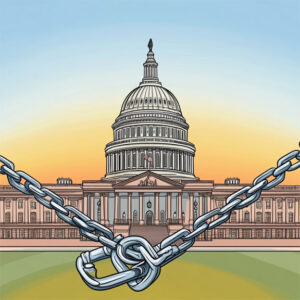 As a political tool, members of congress threaten or engage in a government shutdown. When the government is shut down, federal workers can be furloughed and sent home without pay and forbidden from working. Others, like TSA agents, can be compelled to work without pay. As the government shutdown does not shut down bills and expenses, the unpaid workers will be harmed by their lack of income. While some federal workers are well paid, many live from paycheck to paycheck and have few financial reserves. Because of this, some federal workers have turned to food banks during past shutdowns. In addition to the impact on workers, there are indirect impacts on those providing goods and services. After all, people who are not getting paid will be spending less.
As a political tool, members of congress threaten or engage in a government shutdown. When the government is shut down, federal workers can be furloughed and sent home without pay and forbidden from working. Others, like TSA agents, can be compelled to work without pay. As the government shutdown does not shut down bills and expenses, the unpaid workers will be harmed by their lack of income. While some federal workers are well paid, many live from paycheck to paycheck and have few financial reserves. Because of this, some federal workers have turned to food banks during past shutdowns. In addition to the impact on workers, there are indirect impacts on those providing goods and services. After all, people who are not getting paid will be spending less.
In addition to the financial impacts, there are other harms. One example is the national parks. There is also the harm suffered by those who need the federal services. There are also the long-term harms of the shutdown. While one could write almost endlessly of the harms of a shutdown, it suffices to say they are harmful and something that should be avoided.
Debating about who is to blame for any shutdown is often a fruitless endeavor because of the partisan divide. Minds will generally not be changed by evidence or reasons. That said, a shutdown requires both parties: if one party gives in to the other, then the shutdown will end. From a moral standpoint, both sides bear some blame. However, the blame need not be equal.
After all, refusing to give in to a threat to harm others can be morally acceptable. And it is usually the Republicans who make such threats. From a utilitarian standpoint, giving in would be wrong if it created more harm than refusing to do so. This utilitarian calculation can consider more than just the immediate factors. For example, it should also include that yielding to such tactics encourages their future use.
The ethics of the shutdown comes down to two moral concerns. The first is whether it is morally acceptable to hurt innocent people to get what you want. The second is whether it is morally acceptable to refuse to give someone what they want when they threaten to harm the innocent.
From a utilitarian standpoint, the matter is settled by weighing the harm against benefit. The benefits can include preventing harm. So, a shutdown would be morally acceptable if doing so prevented greater harm, since shutdowns are always harmful. What must also be considered is whether there is an alternative to the shutdown. To use an analogy, if someone proposed a risky surgery, failing to consider alternatives would be morally irresponsible. In the case of the shutdown, there are alternatives. One is to use a less harmful process of negotiation and for each side to agree they will not use the shutdown as a political tool.
One practical problem is that the shutdown is perceived as a useful, albeit risky, political tool. The side pushing a shutdown will think that it will probably work; the other side thinks they can keep it from working. Both sides think they can score political points. Using a shutdown as a tool requires ignoring or even not caring about the harm being inflicted on the American people. After all, while politicians can lose political points or not get what they want, they are not harmed by their shutdown. This willingness to use people as pawns is morally problematic, assuming you agree with Locke that the purpose of the state is the good of the people.
That said, political, economic and military calculations always involve harming pawns—so the shutdown could be seen as just another move in the political game. This can be countered by arguing that there are better alternatives, and so causing harm is not necessary. As such, the shutdown would seem to be an unethical political tool. Unfortunately, just as it takes two to shut down the government, it also takes two to avoid it: both parties must agree to not shut it down. But as long as it is seen as a viable tool and if politicians are willing to hurt Americans to achieve their political goals, then we must expect future shutdowns.

 The denotation of a word is what it literally means. The connotation is the emotional loading of the word, which can be negative or positive; this is how the word makes you feel. To illustrate, “swarm” and “infestation” have strong negative connotations. Whether the connotation is negative or positive depends on various factors, such as how the audience feels about the word. For example, the connotation of “socialism” is negative for most Americans but obviously positive to socialists. Two words can have the same denotation, but very different connotations. For example, the slang “pig” and the word “police” have the same denotation, but different connotations. As would be expected, rhetoric uses the influence of connotation to affect how people feel.
The denotation of a word is what it literally means. The connotation is the emotional loading of the word, which can be negative or positive; this is how the word makes you feel. To illustrate, “swarm” and “infestation” have strong negative connotations. Whether the connotation is negative or positive depends on various factors, such as how the audience feels about the word. For example, the connotation of “socialism” is negative for most Americans but obviously positive to socialists. Two words can have the same denotation, but very different connotations. For example, the slang “pig” and the word “police” have the same denotation, but different connotations. As would be expected, rhetoric uses the influence of connotation to affect how people feel. During Trump’s first term the United States
During Trump’s first term the United States